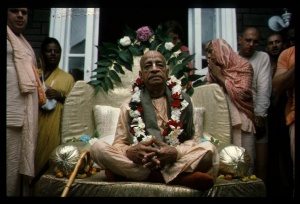SB 4.29.84

A.C. Bhaktivedanta Swami Prabhupada
TEXT 84
- etan mukunda-yaśasā bhuvanaṁ punānaṁ
- devarṣi-varya-mukha-niḥsṛtam ātma-śaucam
- yaḥ kīrtyamānam adhigacchati pārameṣṭhyaṁ
- nāsmin bhave bhramati mukta-samasta-bandhaḥ
SYNONYMS
etat — this narration; mukunda-yaśasā — with the fame of Lord Kṛṣṇa; bhuvanam — this material world; punānam — sanctifying; deva-ṛṣi — of the great sages; varya — of the chief; mukha — from the mouth; niḥsṛtam — uttered; ātma-śaucam — purifying the heart; yaḥ — anyone who; kīrtyamānam — being chanted; adhigacchati — goes back; pārameṣṭhyam — to the spiritual world; na — never; asmin — in this; bhave — material world; bhramati — wanders; mukta — being liberated; samasta — from all; bandhaḥ — bondage.
TRANSLATION
This narration spoken by the great sage Nārada is full of the transcendental fame of the Supreme Personality of Godhead. Consequently this narration, when described, certainly sanctifies this material world. It purifies the heart of the living entity and helps him attain his spiritual identity. One who relates this transcendental narration will be liberated from all material bondage and will no longer have to wander within this material world.
PURPORT
As indicated in verse 79, Nārada Muni advised King Prācīnabarhi to take to devotional service rather than waste time performing ritualistic ceremonies and fruitive activities. The vivid descriptions of the subtle and gross bodies in this chapter are most scientific, and because they are given by the great sage Nārada, they are authoritative. Because these narrations are full of the glory of the Supreme Personality of Godhead, they constitute the most effective process for the purification of the mind. As Śrī Caitanya Mahāprabhu confirmed: ceto-darpaṇa-mārjanam (CC Antya 20.12). The more we talk of Kṛṣṇa, think of Kṛṣṇa and preach for Kṛṣṇa, the more we become purified. This means we no longer have to accept a hallucinatory gross and subtle body, but instead attain our spiritual identity. One who tries to understand this instructive spiritual knowledge is delivered from this ocean of nescience. The word pārameṣṭhyam is very significant in this connection. Pārameṣṭhyam is also called Brahmaloka; it is the planet on which Lord Brahmā lives. The inhabitants of Brahmaloka always discuss such narrations so that after the annihilation of the material world, they can be directly transferred to the spiritual world. One who is transferred to the spiritual world does not have to go up and down within this material world. Sometimes spiritual activities are also called pārameṣṭhyam.